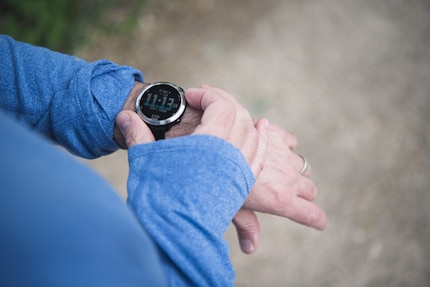
Guide
10 training mistakes you’re probably making
by Patrick Bardelli

Question: two women with the same weight, height, age and the same best time for 10 km go jogging. Do they have the same heart rate when they're running together?
Of course not, you'll argue. And you'd be absolutely right. That's because the human heartbeat is as unique as the person. In fact, your heart rate doesn't say much about your performance. Unless you compare your own heart rate over time.
Pulse value formulas are always floating around in the world of endurance sports. For example, some people say the maximum heart rate is 220 minus your age. As it happens, this isn't a bad formula for the maximum heart rate, as it takes into account the fact the heart rate lowers as we get older. When we're younger, it can easily go up to 220 beats per minute. But as we age, it drops noticeably. For most people it's between 160 and 180 beats.
This rule of thumb is only an approximation, as the example of how it came into being shows. For a maximum heart rate, a certain number of heart rates were taken as reference and the average determined. Then they looked for a formula that came as close to this average as possible. So when a thousand people have a maximum heart rate of 190 and another thousand have a heart rate of 170, the average is 180. And for every two thousand, it's really quite close to the real value – but still slightly off.
Endurance sports are all about using the whole spectrum of the human heartbeat, from the resting heart rate to the maximum heart rate when it's under more pressure. The spectrum for endurance-trained athletes is roughly between 50 and over 200 beats per minute. It's very difficult to overstress a healthy heart deliberately. That's why it's not dangerous to push to your personal limit during a competition.
The more often the human heart is put under strain, the more it gets trained and can pump more oxygen around the body with each heartbeat. Afterwards, the resting heart rate falls. And so it's not surprising that sporty people usually have a lower resting heart rate than smokers and people who are overweight or who have a sedentary lifestyle. The latter can have a resting heart rate of as high as 90 beats per minute. This obviously means that a sportsperson's heart doesn't have to work as hard on a daily basis than their sedentary counterpart. Let's do the maths: 40 beats' difference per minute means 2,400 beats' difference per hour and a terrific 57,600 beats' difference per day for the untrained heart. And even if a sportsperson does an hour of sport per day with a heart rate of 150 causing 9,000 extra beats, the total daily heartbeats is still around 50,000 less than those who don't do sport. The chance of the body's motor, the heart, lasting longer increases.

In sports terms, using the whole spectrum of the heartbeat means training at different intensities. Long-term range workouts (such as endurance runs and bike rides) usually give a heart rate in the range of 110 to 150 beats. Short and high-intensity bursts of exercise make the heart rate go up. In practice, the maximum heart rate proved to be a good benchmark for determining individual intensities. Different levels of performance can be defined based on the maximum heart rate (90% of the maximum heart rate, 80%, 70%, and so on).
Not sure what your maximum heart rate is? Try this: after 10 minutes of walking or running increase to an easy and regular pace for two to three minutes and go as fast as you can for the last minute. Then measure your heart rate after the last minute. Take care: if you're over 40 and/or don't work out regularly, check with your doctor first.
Here's another thing to bear in mind when it comes to heart rates. Your heart rate isn't the same in every situation. It varies from day to day to a certain extent. That's why it's so interesting to observe how the heart rate changes during certain activities or how high it is when you get up, for instance. High heart rates in the morning can be a sign of a possible infection or not enough rest. The same goes for a higher heart rate than normal when you're going the same speed. Your maximum heart rate is also dependent on how much you push to your limit and what type of sport you're doing. A sportsperson won't have the same maximum heart rate when they're swimming as when they're running or cycling.
It's different again in a competition situation. Nerves can make your heart rate higher than normal. Outside temperature, the place you're working out in and your fitness on the day can also have an impact on your heart rate. Heart rates and heart rate limits can help beginners to pace themselves at the start of a competition. But it's important to trust how you feel and sometimes run with a heart rate monitor. You can still record the data as it gives helpful insights. That way, you can see if your gut feeling was right.
You can find more sports coverage, background reporting, how-to posts and get-to-knows on my author profile. Just click «Follow author» so you don't miss anything.
From radio journalist to product tester and storyteller, jogger to gravel bike novice and fitness enthusiast with barbells and dumbbells. I'm excited to see where the journey'll take me next.
Practical solutions for everyday problems with technology, household hacks and much more.
Show all